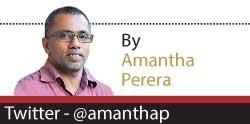Reply To:
Name - Reply Comment
 ‘Wooing to them, but full of woe for us’ – said the message. One sent by a close colleague, correcting yet another one of my many grammar faux-pas that had crept into Twitter. Instead of woo I had used woe.
‘Wooing to them, but full of woe for us’ – said the message. One sent by a close colleague, correcting yet another one of my many grammar faux-pas that had crept into Twitter. Instead of woo I had used woe.
The innocuous message got me thinking, first it was funny, then it suddenly sank into me, the reality of experiencing a Sri Lankan election from thousands of miles away. This was a first for me. I was experiencing this through tunnel vision. It was odd, I was getting information on issues, places and people I know a great deal about on Facebook or Twitter. It was novel, educating, infuriating and personal. Social media made things so afar, so much close.
The affect was like stepping out into the searing Colombo heat from the A/C comfort of a vehicle or a building. It just burns you initially, but then you get used to it. Your sweaty skin no longer bothers you. This was like feeling the heat, or knowing what it was like, but also knowing that you were not going to sweat. I no longer had the skin in the game. I used to, but not anymore.
Social media had come of age in Sri Lanka. Now it was the main medium politics was being played out on. Hours before Gotabaya Rajapaksa was declared winner his close confidants congratulated him on Twitter
But a lot of people I was close to had. They were in this for the long haul and I sensed their anxieties, fears and joys. Social media had come of age in Sri Lanka. Now it was the main medium politics was being played out on. Hours before Gotabaya Rajapaksa was declared winner his close confidants congratulated him on Twitter.
They knew. How? By the messages that polling agents were relaying. How did they know, by observing the ballot papers that were being stacked one on top of the other. Taller the stack, higher the advantage. This is how polling agents conveyed a general idea of the results decades back. But now the news was travelling at cyber speed. What was missing were pictures.
If the Elections Commission had not been so strict on images from within booths appearing on social media the chances would have been high that we would have got images from within counting centres – a few selfies. During 2015 election we got a privileged set of siblings posing for a selfie just outside the booth.
Our main concerns before elections was that social media would spew out fakes at a rate. It did. But they did not gain traction. There were dozens of amateurs who had taken it on themselves to be fact checkers. There were two fact checking entities that Facebook worked with in Sri Lanka. In the overall scheme of things, I don’t think their contribution was as influential as of the others and the general awareness on fakes.
Sri Lanka is a market that is not a profit-generating one for the likes of Facebook (two million from a global pool of over two billion). We cannot expect companies to invest at scale, to be the benevolent social do-gooders that they profess to be.
Sri Lanka is a market that is not a profit-generating one for the likes of Facebook
There were dozens of amateurs who turned fact checkers
The most effective way to curb the influence of fakes is to build awareness
However, inversely the impact of two million Facebook account is immense in Sri Lanka. The most effective way to curb the influence of fakes is to build awareness. Unfortunately such awareness does not do anything to curb hate speech and abuse. They just spew out regardless.
As the election concluded, hate speech replaced fakes. The vitriol was worse than anything we have seen in the past. Unless Facebook and other social media platforms take note and set up structures to monitor and curb such posts, we are going to run into a cyber cess pit.
The platforms will not invest anything other than cosmetic interventions. That leaves the country precariously placed.
The author is currently pursuing a Masters by Research at CQ University, Melbourne on online journalism and trauma